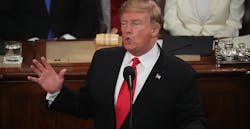Trump Says Trade Deal with China Must Include Structural Change
President Donald Trump in his State of the Union address said a trade deal with China will have to address not only what he called the chronic U.S. trade deficit but also changes in Chinese policies to protect American workers and businesses.
“I have great respect for President Xi, and we are now working on a new trade deal with China,” he said Tuesday at the Capitol in Washington, referring to his Chinese counterpart Xi Jinping. “But it must include real, structural change to end unfair trade practices, reduce our chronic trade deficit, and protect American jobs.”
U.S. Trade Representative Robert Lighthizer and Treasury Secretary Steven Mnuchin will lead a delegation to Beijing next week to lay the groundwork for a meeting between Trump and Xi later this month.
In his speech, Trump blamed past U.S. administrations and lawmakers “for allowing this travesty to happen” between the world’s two largest economies and said his tariff strategy is working.
“We are now making it clear to China that after years of targeting our industries, and stealing our intellectual property, the theft of American jobs and wealth has come to an end,” he said. “Therefore, we recently imposed tariffs on $250 billion dollars of Chinese goods -- and now our Treasury is receiving billions and billions of dollars.”
U.S. and Chinese negotiators last week made progress during two days of talks in Washington, but Lighthizer said the two sides still had a lot of work to do and had not even started putting the framework of a deal on paper.
Trump set a March 1 deadline for the U.S. and China to reach a satisfactory solution before tariffs on $200 billion of Chinese goods are set to more than double to 25%. The trade war has resulted in $360 billion in tariffs imposed on each other’s goods and has caused turmoil for financial markets and businesses to rethink their supply chains.
New NAFTA
The president also called on members of Congress to approve his new trade agreement with Mexico and Canada, saying it will lead to more manufacturing in the U.S.
“Our new U.S.-Mexico-Canada Agreement -- or USMCA -- will replace NAFTA and deliver for American workers like they haven’t had delivered to for a long time,” said Trump. “I hope you can pass the USMCA into law so that we can bring back our manufacturing jobs in even greater numbers, expand American agriculture, protect intellectual property, and ensure that more cars are proudly stamped with our four beautiful words: Made in the U.S.A.”
The USMCA was reached in September and signed by Trump and his Mexican and Canadian counterparts on the sidelines of the Group of 20 summit in November.
Key lawmakers in Trump’s own party said they would not move to vote on the agreement until the White House removes the steel and aluminum tariffs it imposed on its northern and southern neighbors last year. Those duties have sparked in-kind retaliation from Mexico and Canada that’s targeted U.S. agricultural goods.
Democrats in both the Senate and the House of Representatives have said the deal doesn’t go far enough on labor and enforcement and have demanded reopening the negotiations before they could give the deal their blessing. Still, Lighthizer said reopening the deal was not an option, further jeopardizing Democratic support.
Trump is widely expected to withdraw from NAFTA to put pressure on lawmakers to quickly approve his new deal. His own advisers, including Lighthizer, however, have privately advised him against forcing Congress’s hand, people familiar with the internal deliberations said.
Reciprocal Trade
The president also asked lawmakers to approve the U.S. Reciprocal Trade Act. The bill was drafted by White House trade adviser Peter Navarro and introduced last month by Representative Sean Duffy, a Republican from Wisconsin. It would allow Trump to impose tariffs on products “if the president determines” that either tariff or non-tariff barriers on that product are higher than the U.S.’s.
Trump said Tuesday the legislation was necessary “so that if another country places an unfair tariff on an American product, we can charge them the exact same tariff on the same product that they sell to us.”
The White House’s push for more tariff authority comes at a time when both parties in Congress are trying to limit Trump’s trade powers. Bipartisan legislation to do so was introduced in both chambers of Congress last week but its path forward is unclear as Trump is likely to veto any attempt to hamstring him.
By Jenny Leonard
About the Author
Bloomberg
Licensed content from Bloomberg, copyright 2016.
